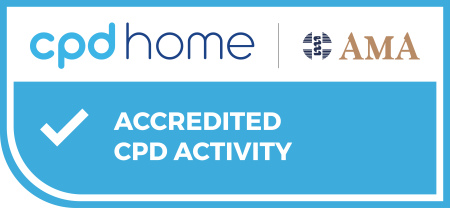Finding accredited CPD
This comprehensive course covers the complexities of diagnosing and treating depression in the elderly, with six detailed units that address risk factors, diagnostic criteria, and treatment options. Participants will learn practical approaches for managing depression in older adults, including the use of medications, psychological interventions, and real-world case studies.
Unit 1: Risk of Depression
This unit highlights the risk factors that increase the likelihood of depression in the elderly. It covers the physiological, psychological, and social contributors to depression in older adults, such as chronic illness, hospitalizations, and bereavement. The importance of recognizing these risks early to provide effective interventions is emphasized.
Unit 2: Diagnosis
In this unit, participants will learn how to diagnose depression in the elderly using specific tools like the Geriatric Depression Scale and mental state examinations. The unit explores how depression in older adults can manifest differently than in younger patients, often presenting through somatic complaints or cognitive changes.
Unit 3: Treatment – Psychological Approaches
This unit focuses on the psychological treatment of depression in the elderly, including cognitive-behavioral therapy (CBT), problem-solving therapy, and reminiscence therapy. It highlights the importance of psychoeducation, lifestyle changes, and social engagement in treating mild to moderate depression.
Unit 4: Treatment with Medication and Other Modalities
Participants will explore pharmacological treatments for severe depression, including the use of SSRIs, SNRIs, and other medications. The unit also covers the risks of polypharmacy in the elderly and the importance of tailoring treatments to avoid adverse effects.
Unit 5: Clinical Case 1
This unit presents a clinical case study involving a 75-year-old patient with Parkinson’s disease and depression following a stroke. It details the steps in assessment, diagnosis, and treatment, emphasizing the importance of integrating psychological and pharmacological approaches.
Unit 6: Clinical Case 2
The second case study examines the complex depression of a 58-year-old Indigenous patient with multiple comorbidities. This unit addresses the challenges of treating depression in culturally diverse populations, considering both mental and physical health.
This course is ideal for healthcare professionals looking to enhance their skills in managing depression in the elderly and improve patient outcomes through tailored, evidence-based interventions.
Cost: $195
Suitable for: All degree qualified medical practitioners.
Study mode: 100% online
Disclaimer: Please note, once you click 'Register now' you will be leaving the AMA’s CPD Home website and entering a third-party education provider’s website. If you choose to register for this learning, you will need to provide some of your personal information directly to the third-party education provider. If you have any queries about how third-party education providers use, disclose or store your personal information you should consult their privacy policy.
Upon completion, your CPD activity record may take up to 4 weeks to be reflected on your CPD Home Dashboard.
You have to log in to see the content of this module.
Provided by
Accredited by

*Medical Board of Australia’s (MBA)’s revised Registration Standard: Continuing professional development (the Standard)